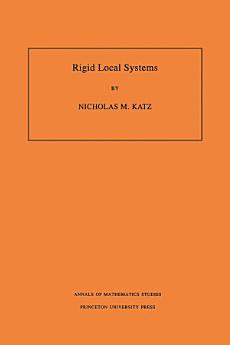Rigid Local Systems
mar 2016 · Princeton University Press
eBook
219
Páginas
family_home
Apto
info
reportLas valoraciones y las reseñas no se verifican. Más información
Información sobre este eBook
Riemann introduced the concept of a "local system" on P1-{a finite set of points} nearly 140 years ago. His idea was to study nth order linear differential equations by studying the rank n local systems (of local holomorphic solutions) to which they gave rise. His first application was to study the classical Gauss hypergeometric function, which he did by studying rank-two local systems on P1- {0,1,infinity}. His investigation was successful, largely because any such (irreducible) local system is rigid in the sense that it is globally determined as soon as one knows separately each of its local monodromies. It became clear that luck played a role in Riemann's success: most local systems are not rigid. Yet many classical functions are solutions of differential equations whose local systems are rigid, including both of the standard nth order generalizations of the hypergeometric function, n
F
n-1's, and the Pochhammer hypergeometric functions.
This book is devoted to constructing all (irreducible) rigid local systems on P1-{a finite set of points} and recognizing which collections of independently given local monodromies arise as the local monodromies of irreducible rigid local systems.
Although the problems addressed here go back to Riemann, and seem to be problems in complex analysis, their solutions depend essentially on a great deal of very recent arithmetic algebraic geometry, including Grothendieck's etale cohomology theory, Deligne's proof of his far-reaching generalization of the original Weil Conjectures, the theory of perverse sheaves, and Laumon's work on the l-adic Fourier Transform.
F
n-1's, and the Pochhammer hypergeometric functions.
This book is devoted to constructing all (irreducible) rigid local systems on P1-{a finite set of points} and recognizing which collections of independently given local monodromies arise as the local monodromies of irreducible rigid local systems.
Although the problems addressed here go back to Riemann, and seem to be problems in complex analysis, their solutions depend essentially on a great deal of very recent arithmetic algebraic geometry, including Grothendieck's etale cohomology theory, Deligne's proof of his far-reaching generalization of the original Weil Conjectures, the theory of perverse sheaves, and Laumon's work on the l-adic Fourier Transform.
Acerca del autor
Nicholas M Katz is Professor of Mathematics at Princeton University.
Valorar este eBook
Danos tu opinión.
Información sobre cómo leer
Smartphones y tablets
Instala la aplicación Google Play Libros para Android y iPad/iPhone. Se sincroniza automáticamente con tu cuenta y te permite leer contenido online o sin conexión estés donde estés.
Ordenadores portátiles y de escritorio
Puedes usar el navegador web del ordenador para escuchar audiolibros que hayas comprado en Google Play.
eReaders y otros dispositivos
Para leer en dispositivos de tinta electrónica, como los lectores de libros electrónicos de Kobo, es necesario descargar un archivo y transferirlo al dispositivo. Sigue las instrucciones detalladas del Centro de Ayuda para transferir archivos a lectores de libros electrónicos compatibles.






